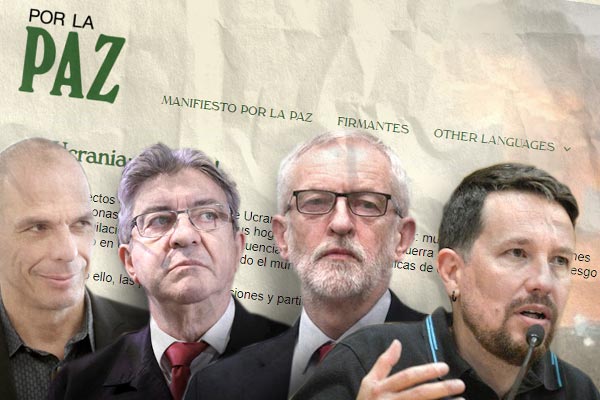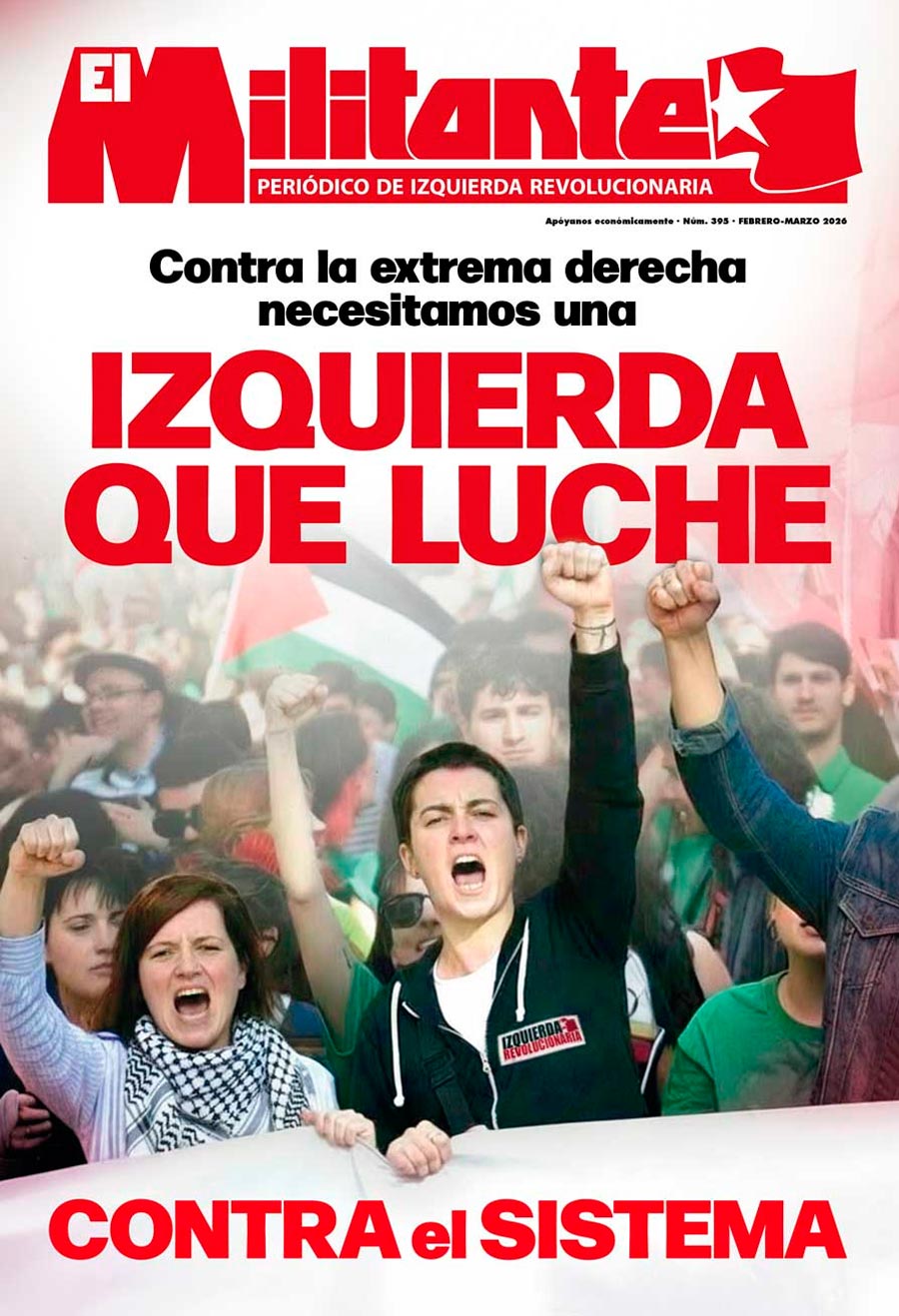We live exceptional moments. Day after day, the media inform us of how our world is transforming into one of those apocalyptic dystopias that are the protagonists of so many science fiction series and movies: nature is dying and infuriated by climate change, extreme temperatures and droughts coexist with devastating floods, famines set new records, sectors of the right increasingly brazenly display the fascist boot, the struggle for world hegemony intensifies by resurrecting the nuclear threat, inflation skyrockets on the eve of a new economic recession fueling plus a new wave of popular uprisings and workers' strikes...
And it is precisely in the midst of this terrifying reality that the war breaks out in Ukraine. We are facing what we Marxists call a turning point in history, which will transform our lives and the way we see and understand the world. It is easy to see that we are not facing another war conflict and that the two most powerful powers on the planet have taken a new step in their struggle, even going so far as to speculate on the possibility of a Third World War.
The capitalist system as a whole, and bourgeois democracy as its most brilliant political architecture, have not only lost social legitimacy; the internal balance they have enjoyed in recent decades is faltering. It is clear that the strategies of US imperialism, dominant in international relations after the collapse of the USSR, have been blown up. The profound changes in the world correlation of forces determine this new era, and reflect the powerful transformations that have taken place at the base of international capitalism: the decline of the North American colossus and its limitations to face the advance of China as a superpower.
Peace, diplomacy and war propaganda
From this perspective, the war in Ukraine also subjects the organizations of the left to the most important test since the collapse of Stalinism. Whether they have more than a century of history or just a decade of existence, large or small, all, without exception, will be marked by their position on this issue.
Unsurprisingly, classical social democracy has not brought us any surprises. From Pedro Sánchez, through the Norwegian Labor Party member Jens Stoltenberg —current Secretary General of the Atlantic Alliance— to the Swedish Prime Minister, the Social Democrat Eva Magdalena Andersson, who is anxiously counting down the days until her country joins NATO, all of them they behave like battle-hardened and trustworthy militarists for Western imperialism. Nothing new under the sun.
For the militants and activists who are immersed in social movements, in combative trade union struggles, who sincerely aspire to change the present in which we live, it is much more necessary to clarify what is the position of the other left now institutionalized, but which emerged at the heat of the mobilizations of recent years. And what better way to do this than to address in depth the Ukraine Manifesto: Peace Now![1], published on April 18 as a preamble to the European Conference for Peace held in Madrid four days later.
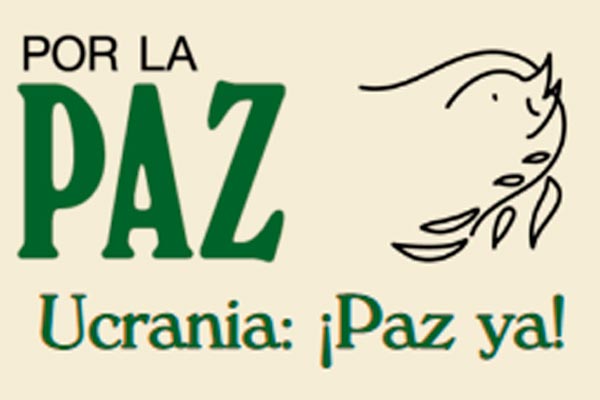
Organizations such as Podemos, ERC, EH Bildu, BNG and international guests such as Jeremy Corbyn or Catarina Martins, from the Portuguese Bloco de Esquerda, participated in the meeting. The Manifesto also has the signature of Pablo Iglesias, Declan Kearney (Sinn Fein), Nicola Fratoianni (Sinistra Italiana), Yannis Varoufakis, Noam Chomksy or Rafael Correa (former president of Ecuador). Jean-Luc Mélenchon (Rebellious France) and Dimitris Tzanakopoulos (Syriza) have also joined.
Despite the scant projection achieved so far by this initiative, its interest lies in the fact that it dusts off the old pacifist positions that already provoked a heated controversy in the labor movement during the First and Second World Wars. Let's start from the statement that says it verbatim:
“We demand an immediate ceasefire and support negotiations for a full and lasting peace. The United Nations and other relevant international bodies must be ready to guarantee any agreement.
President Zelensky has outlined the two most essential conditions for peace: the invading Russian troops must withdraw from Ukraine and Ukraine becomes a neutral country. We urge governments and the media to put aside all belligerent language and promote and strengthen dialogue on this basis (...)
We call on governments to protect the welfare state, guarantee social rights for all citizens and reduce inequality. It is time for the great fortunes and large companies to contribute equitably to society so that the incomes and bodies of the vast majority do not bear, once again, the cost of this crisis”.
Six months after the start of the war, it does not seem that the central aspects of the manifesto have had any echo, rather the opposite. As Lenin used to write, the truth is concrete, and if we stick to the facts, the wishes of this declaration, including the flattery with which Zelensky is adorned, have crashed against the dynamics of the conflict and the powerful interests that are at stake. .
It would really be wonderful to end so much suffering thanks to individuals who believe they are endowed with the ability to move the powerful with speeches. Just like in one of the Disney songs, we could live in an ideal world. But the stubborn reality, at least for the vast majority, increasingly resembles a horror movie.[2]
Is it possible that Pablo Iglesias, Jeremy Corbyn, Mèlenchon or Varoufakis really believe that the diplomatic efforts of the UN will end this conflict? Do you think that appealing to the humanity of governments will protect the welfare state and social rights or reduce inequality? sure not. They are intelligent enough and read enough, and from experience they know how the economic, political and military power acts.
So why do they tell us that "President Zelensky has outlined the two most essential conditions for peace"? Do you not see Zelensky rejecting any negotiation that leads to peace while sacrificing millions of his fellow Ukrainians in a war he is waging for the interests of Western imperialism? Don't they know that one of the most rabidly bellicose elements is the main person in charge of European diplomacy, the Spanish "socialist" Josep Borrel, who declared before Zelenski "the least we can do is give you weapons (...) you need weapons, weapons, weapons"[3]?
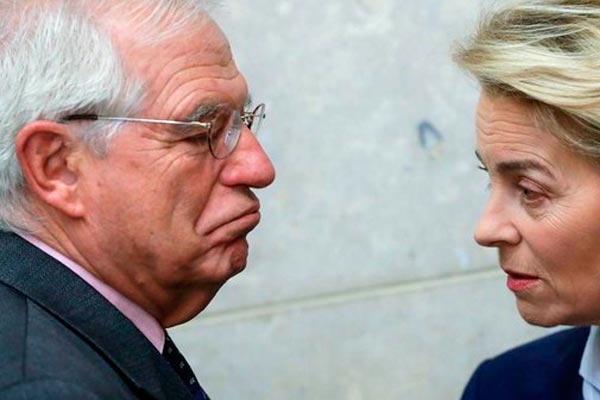
There is nothing original in this either. Lenin also had to deal during the First World War with "people in whom an unprecedented naivety goes hand in hand with a cunning desire to perpetuate the old hypocrisy"[4]. It is not worth speculating on the honesty or opportunism of the statement because in the end what counts are its effects among activists: to awaken illusions - as false as they are reactionary - that the imperialist powers that have perpetrated the greatest war crimes and state terrorism can provide a just solution.
As Rafael Poch, a usually well-informed journalist and surprising signatory of the Manifesto, recently recalled: "France fought in Algeria and left a million dead there. In Indochina it caused another 350,000. England settled the imperial separation of India and Pakistan with a million dead and 15 million displaced persons. In Kenya, decolonisation resulted in 300,000 dead and 1.5 million interned. Even the tiny Netherlands has just acknowledged the 100,000 deaths it caused in its four-year colonial war in Indonesia. And what about the United States, the great patron saint of the Western bloc? Its imperial decline has been dragging with it a permanent war for decades. Since 11 September 2001 it has caused the destruction of entire societies, 38 million displaced persons and 900,000 dead, according to the rather benign estimate of the US Brown University ('Cost of War')"[5].
We could include many more misdeeds in this curriculum for peace, such as organising bloody military coups in Latin America or backing the Zionist regime in Israel to crush the Palestinian people. But there is no one worse blind than he who does not want to see, says the popular wisdom.
Moreover, it turns out that according to the leaders of Podemos, ERC, EH Bildu or the BNG, the "media should leave aside all belligerent language to help achieve peace". These are the same media responsible for disseminating a grinding war propaganda at all hours, and fill their spaces with statements against the totalitarian threat of the Russians -helped by the also evil Chinese-, who destroy our way of life, and undermine "democracy" and that supposed international legislation that defends human rights. We assume that this threat to Western civilisation does not include the 96.5 million people at risk of poverty in the EU alone[6], or the millions of human beings considered illegal[7] who, by the tens of thousands, die trying to reach so-called first world countries or are crammed into concentration camps in the most inhumane and humiliating conditions imaginable.
The fact is that this campaign of attacks against the Russian people, who are also victims of Putin's capitalist and imperialist regime, is familiar to us. By exculpating American and European imperialism of any responsibility for this war, -Moscow attacked first!!-, they are trying to inoculate us with the poison of chauvinism. It is the same slander they used against the Arab people and the Muslim community to embark us on another famous "clash of civilisations"[8]. At that time, the governments charged with "spreading democracy" in the Middle East, as today in Eastern Europe, decided that the best way to do so was to bomb the Iraqi, Afghan or Syrian people, and to justify the intervention they fabricated false evidence about weapons of mass destruction and many other issues that were repeated from morning to night in the mass media.
Rosa Luxemburg warned against this trap: "whenever bourgeois politicians raised the banner of Europeanism, of the union of European states, they did so with the explicit or implicit aim of directing it against the 'yellow peril', the 'black continent', against the 'inferior races', in short, it was always an imperialist abortion (...) the cornerstone of socialism in the Marxist sense is not European solidarity, but international solidarity, which includes all continents, races and nationalities..." [9]
Militarism dominates and swallows up the world.[10]
All the capitalist powers without exception - including Chinese and Russian imperialism - are preparing, and how, for new wars. In 2020 "world military spending was $1.9 trillion, 2.6% higher than in 2019 and 9.3% higher than in 2011. The global military burden - military spending as a share of global GDP - increased by 0.2 per cent in 2020, to 2.4 per cent".[11]
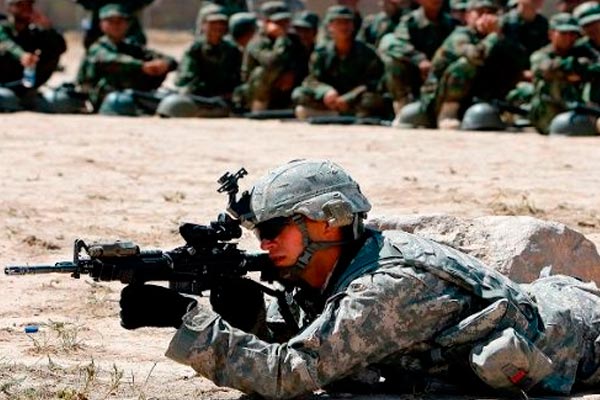
The EU does not want to be left behind: its military budget reached an all-time high in 2020 with 198 billion euros, an increase of 5% over 2019, which was already another record.[12] However, they still do not have enough weapons. The German government, presided over by a Social Democrat, has just announced an investment of 100 billion euros to modernise its armed forces and has committed itself to spending 2% of GDP on defence, as demanded by NATO and the State Department in Washington.
This flood of millions coming out of the public coffers and going straight into the pockets of arms manufacturers - that sinister industry that celebrates the outbreak of each new war - at a time when health, education, public pensions and salaries continue to shrink and shrink, leads us to ask the signatories of the manifesto: where are the governments that will protect the welfare state and guarantee social rights for all citizens by reducing inequality?
It must be honestly acknowledged that austerity is not an agenda exclusive to the right: if we take the policies of the PSOE-UP coalition government from facts rather than propaganda, things become clearer. A concrete example. While the State Association of Directors and Managers of Social Services denounces the bureaucratic, unnecessary and cruel framework that prevents hundreds of thousands of families from accessing scarce social benefits[13], Pedro Sánchez's council of ministers has not only left the war legacy of the PP intact, but will increase military spending to 2% of GDP (in the last five years it has already increased "by 20%, reaching 12,293 million euros in 2021").
Pedro Sánchez has enthusiastically celebrated Madrid's hosting of the NATO summit. Unashamedly aligned with Washington's foreign policy, the Spanish government - in which United Podemos participates - also allows the Spanish military industry to supply Saudi Arabia's arsenals in its war against the Yemeni people, and the same with others such Morocco dictatorship.
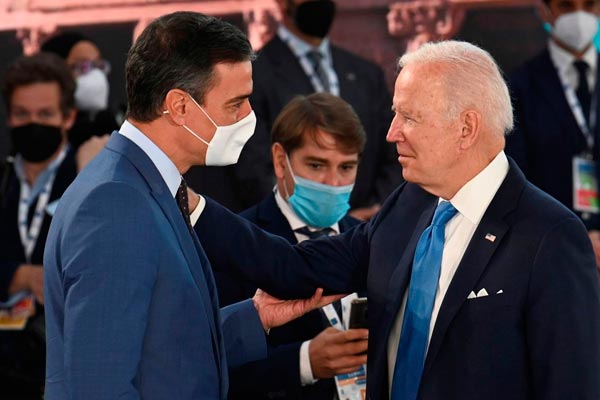
In Ukraine, he has provided the Zelenski regime with abundant ammunition, personal protective equipment and light weapons (grenade launchers and machine guns) and is in the final stages of sending heavy weapons to Kiev, as well as offering to train its military. Sánchez has declared that he will reinforce his contribution to NATO's deployment in Eastern Europe with more troops in Latvia, where he currently has 500 soldiers. But this is not enough either. Margarita Robles has just asked for an extra 3 billion euros for the Defence Ministry's budget, almost 25 per cent more than last year's spending.
Beyond the Spanish government's submission to NATO's strategy, the most important thing is that the Madrid Summit took a step forward with the approval of the Atlantic Alliance's Strategic Concept. The document, which all member nations have signed, leaves no room for doubt about the enemy to beat: "The declared ambitions and coercive policies of the People's Republic of China (PRC) endanger our interests, our security and our values. The PRC employs a wide range of political, economic and military instruments to expand its presence in the world and project power, while maintaining opacity about its strategy, intentions and military rearmament (...) The PRC aims to control key technological and industrial sectors, critical infrastructure and strategic materials and supply chains. It uses its economic advantage to create strategic dependencies and increase its influence.
Western capitalism is fully aware of its weakness and lack of support among the population of its countries, and therefore reinforces its military and repressive apparatus. It makes no secret of its intentions. Despite its rhetoric and hypocrisy, the picture that NATO's declaration paints is crystal clear: we are heading for a global confrontation between the two great imperialist powers that will increase destruction, death and suffering across the planet.
It is difficult, therefore, not to think that the Manifesto's demands, full of respectful diplomacy towards those responsible for the war in Ukraine, have no other motivation than to divert attention from the central issue: what are the causes and character of this war, and what are the means to stop it in the interests of the Ukrainian, Russian and world workers.
Pacifism as a servant of imperialism
The pacifist discourse upheld in the Manifesto is utopian and, moreover, reactionary. Its proposals for ending the Ukrainian conflict have a "narcotising" effect on the consciousness of the working class and feed its passivity: "The result is that, instead of laying bare in all their depths the deepest contradictions of the present phase of capitalism, they are disguised and concealed; the result is bourgeois reformism instead of Marxism"[14].
The experience of the former flagship of European pacifism, the German Greens, is very illustrative of how the facts cruelly belie speeches and wishes. The resounding appeals for peace, which are commonplace in the mouths of German "environmentalist" leaders, have become invariable.
German "ecologists" have invariably turned into unbridled war enthusiasm when they have been in government. The example of their historic leader Joschka Fischer and his unconditional support for the bombing of Yugoslavia in 1999 when he was foreign minister was only the beginning.
<

They are also currently in government with the SPD and the Liberals holding two portfolios: the Foreign Ministry, in the hands of Annalena Baerbock, and the Ministry of Economics and Climate Protection, headed by Robert Habeck, who is also Deputy Chancellor. Despite the fact that the Greens include an explicit ban on arms exports to war zones in their programmes, both have been known for their enthusiastic support for Zelenski's regime and arms shipments, and have not hesitated to vote for the largest German rearmament programme since the Second World War.
A surprised journalist describes the positions of the minister, who is not only an environmentalist but also a radical feminist: "Baerbock's words were unusual, especially coming from a foreign minister of the traditionally pacifist Greens. She repeatedly spoke of a 'defence capability' to ensure security. She said that the war in Ukraine shows 'once again that security depends on NATO', and that Germany is ready to take on more responsibility in that framework. This means, in his view, higher defence spending, such as that announced by Scholz, who intends to allocate 100 billion euros to the Bundeswehr. But it is also reflected in the planned purchase of US F-35 fighter jets, which can carry nuclear weapons. NATO's nuclear deterrent must remain credible, Baerbock said, and the alliance must strengthen its presence in the particularly threatened countries on its eastern flank'.[15]
Marx said that history repeats itself sometimes as tragedy and sometimes as farce. Let everyone decide how he does it on this occasion, but what cannot be doubted is that the discourse of the French pacifists, summed up by Trotsky a century ago, is a carbon copy of that of the German Greens today: " (...) 'We were against the war, our deputies, our ministers, we were all against the war' cry the French petty-bourgeois: 'Therefore, it turns out that the war was forced upon us against our will, and to fulfil our pacifist ideals we must pursue the war to a victorious end.' (...) And so it was that pacifism had its allotted share in the mechanism of war, as did poison gas and the incessantly growing pile of war loans"[16].
To describe the leaders of the Greens as agents of Western imperialism is not a gratuitous insult but a scientific description. The trip of Vice Chancellor and Finance Minister Robert Habeck this March to Qatar is undeniable. According to all those involved, including the spokespersons of the business representatives who accompanied him - Thyssenkrupp, Bayer, Siemens, etc. - it was a success. The good relations with the emir of Qatar, Tamin bin Hamad Al Thani, led to the signing of agreements worth billions of euros with this emirate, which has the third largest natural gas reserves in the world and is known for its complete disregard for democratic rights.
In his report on the trip, a journalist once again cannot conceal his impression of the pacifists' behaviour: "But Qatar, for example, is criticised for its human rights policy and poor working conditions. Is gas from an aggressor country like Russia to be replaced by gas from an autocratic emirate? And this is being promoted by a green politician? Indeed, Habeck claimed, after the meeting with representatives of the Qatari government, to have alluded to 'the poor conditions of the thousands of foreign workers here, and no one left the room' (...)".[17]
Such is the hypocritical nature of Western democracy, whose spokesmen indulge in moral lecturing to world public opinion. It turns out that for the Greens and other "pacifists" of their ilk, the Qatari regime, responsible for forced disappearances of journalists and trade union activists, for subjecting its workforce to conditions of semi-slavery, for brutal oppression of women, is much better than Putin and therefore satisfactory agreements can be reached with him.[18]
If two months before the visit of the German delegation, on 31 January 2022, it was the Qatari emir who travelled to the White House, where Joe Biden declared "Qatar to be one of his greatest allies outside the NATO sphere"... on 16 May, Hamad al-Thani officially visited the Kingdom of Spain to meet with the King, Pedro Sánchez and the president of Iberdrola. The Madrid meeting was just as fruitful.
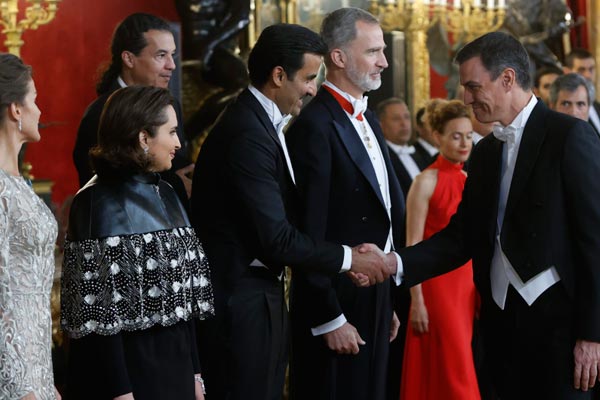
In short, different governments all over the world made up of parties of all colours - American democrats, Greens, German liberals and social democrats, British conservatives or the "most progressive government" in history in the Spanish state - maintain without complexes the closest economic and political relations with all kinds of dictatorships and bloody regimes. Their love of democracy and "peace" is of variable geometry, as it turns out.
Reactionary wars and revolutionary wars
We need concrete answers so that we do not mistake in singling out our enemies and choosing allies. However, this central question is completely ignored in the Manifesto. Zelenski is described in the text as a defender of neutrality, which is an irritating imposture[19], but concepts like imperialism and anything to do with mobilising the working class against the war are conspicuously absent. In short, the Manifesto lacks everything that allows us to understand the nature of the conflict.
The political representatives of the new left flee like the plague when it comes to denouncing the interests of the bourgeoisie and join in the ceremony of confusion. Reproducing the old pacifist slogans and the same sterile appeals to "negotiated solutions" that the leaders of the Second International deployed during the Great War, their abandonment of a class, internationalist, anti-militarist and anti-imperialist position is total.
Lenin insisted that it is a great mistake for revolutionaries to position themselves in a military conflict only on the basis of who fired first, without looking seriously at the class interests represented by each side. Many of those who now occupy seats in government and high state administration in some European countries, and who not so long ago publicly presented themselves as anti-NATO activists, today join the chorus of Western propaganda and hold Putin exclusively responsible for the current scenario, taking great care not to reveal the real objectives pursued by the Atlantic Alliance.
But we need to take a long view of history if we are to understand the present and prepare for the future. NATO's founding act, signed in Washington on 4 April 1949 by the United States, Canada, Belgium, Denmark, France, the Netherlands, Iceland, Italy, Luxembourg, Norway, the United Kingdom and Portugal, declared that "the parties to this Treaty reaffirm their faith in the purposes and principles of the Charter of the United Nations and their desire to live in peace with all peoples and all governments (...) to save the freedom, common heritage and civilisation of their peoples, based on the principles of democracy, individual liberties and the rule of law".
Let's see how the country that promoted it, the United States of America, has fulfilled its purposes. Since it was founded, US imperialism has bombed, intervened militarily, staged coups and planned the slaughter of millions of people in the following countries:
Korea and China 1950-1953
Guatemala 1954
Indonesia 1958
Cuba 1959-1961
Guatemala 1960
Congo 1964
Laos 1964-1973
Vietnam 1961-1973
Cambodia 1969-1970
Guatemala 1967-1969
Grenada 1983
Lebanon 1983, 1984
Libya 1986
El Salvador 1980
Nicaragua 1980
Iran 1987
Panama 1989
Iraq 1991
Kuwait 1991
Somalia 1993
Bosnia 1994, 1995
Sudan 1998
Afghanistan 1998
Yugoslavia 1999
Yemen 2002
Iraq 1991-2003
Iraq 2003-2015
Afghanistan 2001-2015
Pakistan 2007-2015
Somalia 2007-2008, 2011
Yemen 2009, 2011
Libya 2011, 2015
Syria 2014-2016
The only peace the imperialists know is the peace that reigns in the cemeteries. But if the balance sheet of the military and coup interventions of US imperialism is well known, its responsibility for the development of the war in Ukraine is so obvious that it is somewhat embarrassing to have to recall it again.
The allies of the USA, starting with the EU and continuing with international social democracy, shrug their shoulders when they are reminded that NATO was enlarged between 1999 and 2009 to include Hungary, Poland, the Czech Republic, Slovakia, Bulgaria, Slovenia, Estonia, Latvia, Lithuania, Romania, Croatia and Albania. In other words, these champions of "democracy and peace", "the rule of law", "diplomacy", have tried to weaken as much as possible the defensive capacity of the Russian state, which found itself surrounded by an unprecedented hostile encirclement. Plans to continue this military expansion, bringing Ukraine into NATO and further encircling Russia, are the direct responsibility of Washington. How would the US react if Russia or China established military agreements and military bases or nuclear weapons in Mexico or Canada?
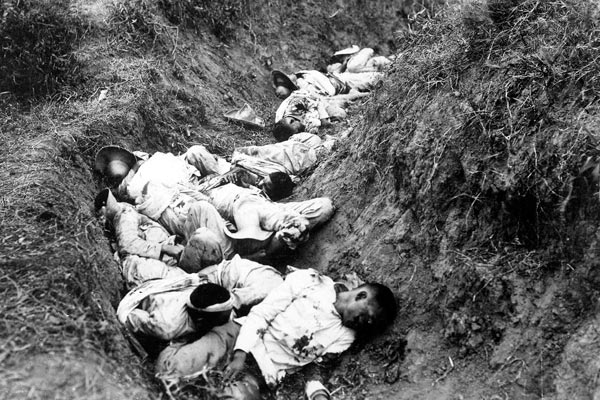
From the perspective of Marxism, violence, war and capitalism are synonymous. Proposing that peace be organised by the same imperialist bandits who have pushed for war in Ukraine is not only selling smoke, it pushes the consciousness of the working class backwards.
The fact is that the capitalists have never rejected violence and resort to it constantly. What they do demand and impose, no matter what the human cost, is their monopoly. And we are not just referring to the army, but to all kinds of armed bodies of men in defence of their property and "their material attachments, prisons and institutions"[20].
For this very reason we Marxists do not declare ourselves against all violence as do the pacifists and the NATO-friendly pseudo-leftists. Engels long ago reminded a contemporary: "violence also plays another role in history, a revolutionary role; which, in Marx's words, is the midwife of every old society that is pregnant with a new one"[21]. Revolutionaries, unlike petty-bourgeois pacifists, defend the right of the oppressed to take up arms against their oppressors, and we never, under any circumstances, equate the violence exercised by the exploiters with that of the exploited struggling to free themselves from their chains.
We vindicate the Spanish workers when, after the military coup of 18 July 1936, they declared war on fascism and launched a socialist revolution comparable only to that of 1917 in Russia. The same goes for the anti-fascist resistance in Nazi-occupied Europe during the Second World War, the heroic struggle of the Red Army against the Hitlerite armies, the revolutionary war of the Chinese peasants against the Japanese occupation and the troops of Chiang Kai-shek, or that waged by the peoples of Cuba and Vietnam against American imperialism.
However, the war in the Ukraine bears no resemblance to any of these historical examples. Obviously, no real communist can support Putin's Great Russian chauvinism.[22] Ukrainian national sentiment is not an invention. Ukraine's national-democratic rights have been crushed throughout history by various imperialist powers - most notably Tsarist despotism - and by the Stalinist bureaucracy which revived Great Russian centralising chauvinism by abandoning Lenin's policy. We Marxists unconditionally support the right of the Ukrainian people to form an independent nation, and we add: liberated from the oppression of the imperialist blocs and the dictatorship of their capitalist oligarchy. We fight, therefore, for an independent and socialist Ukraine.[23]
The formalist approach is a method alien to Marxism. The reactionary character of the Russian capitalist regime alone does not make its opponents progressive. It is so obvious that the so-called Ukrainian "resistance" is led by fascist and nationalist supremacist elements, and that they have been so massively integrated into the state armed forces since 2014, that even Western media as The New York Times have had to openly acknowledge it.
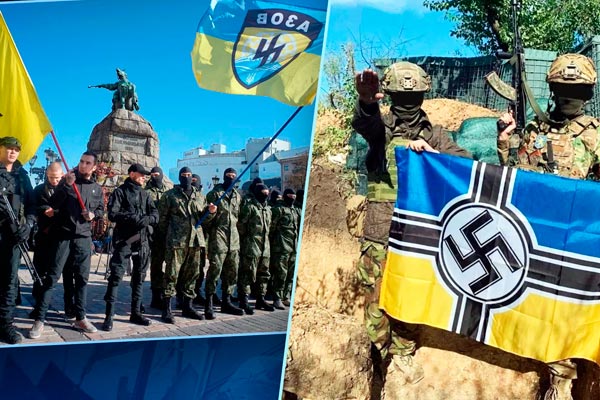
These neo-Nazis, who adorn their uniforms with SA and SS symbols, have to their credit the burning alive of trade unionists and the murder of thousands of ethnic Russians in the Donbas. As if this were not enough to declare them enemies of the entire working class regardless of nationality, they are the military arm of US imperialism in the region. Washington shamelessly brags about how it finances, arms, trains and shares intelligence with this Ukrainian "resistance".[24]
What has this got to do with the revolution led by Mao, Fidel Castro and Che in Cuba, or the defeat of US imperialism in Vietnam? Zelensky does not aim to end capitalism as the Chinese people did, neither to defeat the most powerful representative of big capital as the Vietnamese peasants did. Zelensky, like Putin, immolates thousands of his countrymen in a military conflict with reactionary aims.
If we are looking for a historical parallel to the war in Ukraine, the most appropriate one would be the First World War. As soon as it broke out, Lenin responded to the question of whether the victory of either side would benefit the oppressed as a whole: "In the present situation it is impossible to determine, from the point of view of the international proletariat, the defeat of which of the two groups of belligerent nations would constitute the lesser evil for socialism"[25].
Our position will shock many. That new/old left which is building a "project of a country" beyond party ideologies will accuse us of not defending the sending of arms to Ukraine. This is logical, since in the words of Vice-President Yolanda Díaz, the Russian invasion "is an absolutely illegitimate aggression that violates international law" and "peoples have the right to legitimate self-defence"[26]. Minister Alberto Garzón also thinks this way. What a pity that they forget NATO's militaristic expansion in Eastern Europe over the last three decades, and that they do not apply the same criteria to the Palestinian and Sahrawi people as they do to Ukraine. It is also striking that Yolanda Díaz thinks that Pedro Sánchez, as "president of the government, does nothing more than defend peace and commit himself to the seriousness of a war at the gates of Europe such as we never thought we would have to live through in the 21st century". The same Pedro Sánchez who proudly chairs the NATO summit in Madrid and slavishly supports Washington's plans.
The heirs of Stalinism will also denounce us for not defending Russia because, from their point of view, Putin is "containing Western imperialism", without considering that his regime defends the interests and expansionist objectives of the Russian capitalist oligarchy. And other organisations, which do not quite know why they claim to be anti-capitalist and even Trotskyist, will do so because we do not strongly support the so-called "war of national liberation" which, in their view, Zelensky's troops are waging.
But the reality is always concrete: where are the people's battalions recruited from among the population to defend Ukrainian independence? They have not been able to show any pictures that could approximate such a thing in the six months of the war. But what is published in the Western press, despite the strict censorship we are suffering, is that the Ukrainian government has to resort to increasingly harsh laws to sanction the departure of its citizens of fighting age, because the exodus is massive.
We are witnessing, therefore, a torrent of analysis each time more erroneous and far from a class characterisation that places this conflict in the framework of the struggle between the great powers for world supremacy, control of geostrategic areas, raw materials, trade routes, technology and supply chains...
A victory of NATO, the US, the EU and Zelensky will not free the Ukrainian people from this brutal war destruction. If anything, it will consolidate the power of the pro-Western Ukrainian bourgeoisie, which acts as a lackey of Washington, and which will not hesitate to promote a relentless persecution of the left, which will crush workers' rights by deepening the anti-union legislation already in place, which will open up the economy to further privatisation and turn supremacist nationalism into a state religion. The Russian-speaking population will be at the mercy of the pogromist cudgel of the Azov Battalion and other fascist organisations.
If, on the other hand, it is Putin and his great Chinese ally who triumph, things will be no better, or could we think that the red flags with the hammer and sickle on many Russian tanks, manipulating the anti-fascist struggle of the Red Army, will signify the triumph of communism in the Donbas?[27]
Putin is the visible head of a state monopoly capitalism built on the decomposition of the CPSU and Stalinism. A process that is now once again being celebrated by Western leaders when they eulogise the late Mikhail Gorbachev. But Gorbachev, like Yeltsin, Putin and the bureaucracy that dominated the CPSU were responsible for the destruction of the USSR and the collapse of the living conditions of millions of Soviet citizens, the liquidation of the planned economy and the brutal looting of nationalised public property. They transformed themselves into the new bourgeois oligarchy by taking advantage of their leading positions in the state apparatus, and after three decades, relying on the powerful Russian industrial-military conglomerate, they intend to occupy a leading role on the international scene and to rebuild the traditional spheres of influence of imperialist Russia.
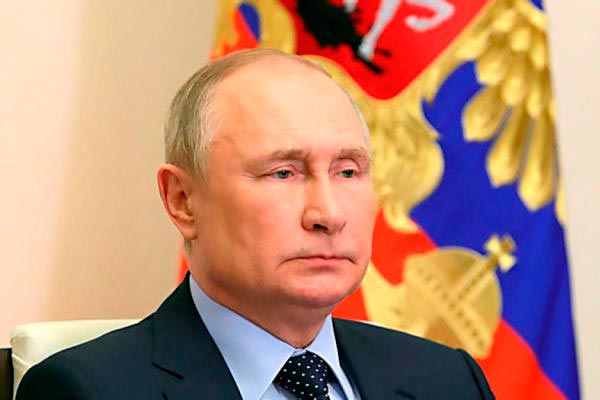
Clearly, Russia's annexation of the Donbas and the Russian army's victory in the war would be a blow from which the US could not easily recover. But to draw the conclusion that this outcome would bring the growth of economic equality for the Ukrainian and Russian people, the end of privatisation and anti-worker legislation, or the containment of Great Russian chauvinist nationalism (which is so well attuned to the world ultra-right), is to stand outside of reality. The inter-imperialist struggle would not cease. I will intensify in the following years, preparing new wars and bloody conflicts.
Both imperialist sides lack progressive aims, i.e. they are equally reactionary, but they need to hide their unspeakable aims behind false flags. This is nothing new either. "In order to hoodwink the proletariat and distract its attention (...) the bourgeoisie of each country endeavours, with mendacious phrases about patriotism, to exalt the meaning of 'its' national war and to assure itself that it aspires to defeat the adversary not for the sake of plunder and territorial conquests, but for the sake of the 'emancipation' of all other peoples..."[28]
Politics is concentrated economics
In his work on imperialism, Lenin stressed that it was "inconceivable that spheres of influence, interests, colonies, etc., could be shared out except by the strength of those who participate in it, economic, financial, military, etc."[29] Frivolous reports of Putin's illness or Biden's senility to explain this juncture, as well as interpreting Trumpism as a passing phenomenon led by a buffoon, are nothing more than distractions to divert attention from the central point. However despicable or ridiculous these characters may be, the point is that they are merely the visible face of the decisions of the most powerful capitalists.
Marxists use a method of analysis that is the opposite of the one put forward in the Manifesto of the new left. We do not describe the workings of society on the basis of well-intentioned wishes or brilliant subjective witticisms, and then force reality to fit into an artificial scheme. We study the world as it is, starting from "a complete analysis of the concrete social phenomenon in its development", allowing "the external and apparent to be reduced to the essential driving forces, the development of the productive forces and the class struggle"[30]. We are committed to a dynamic vision, capable of approaching all the twists and turns of the changing reality, and we set aside the propaganda with which the ruling class bombards us in order to hide the real facts.
"Miraculous prophecy is nothing but a fable, but scientific prophecy is a fact," Lenin claimed, recalling how Engels anticipated the outbreak of the First World War by applying this method: "And this will be a world war of unprecedented scale and ferocity. Eight to ten million soldiers will annihilate each other and, in so doing, will devastate the whole of Europe, to such an extent as locust swarms have never done. The devastation caused by the Thirty Years' War, compressed into a period of three or four years and spread over the whole continent.."[31].
Marxists do not expect the capitalists to make the most reasonable policy for humanity, but the one most beneficial to their interests. The agenda of Biden and Zelenski or Xi Jinpin and Putin cannot be explained by their particular evil or insanity, but by the clash of contradictory interests between the ruling classes who are fighting for control of the world. And politics is concentrated economics, because "when economic tasks, interests and processes acquire a conscious and generalised (i.e. 'concentrated') character, they enter, by virtue of this very fact, into the sphere of politics, and constitute its essence"[32].
It is true that Hitler was surely corroded by physical complexes of all kinds and psychopathic tendencies as some studies claim, but he did not get where he did because of these aspects of his personality, but because his programme, that of fascism, was what the German capitalists needed to crush the working class: "On February 20, 1933, Krupp, together with about twenty businessmen, met with the newly elected Chancellor. Hitler offered them a deal: in return for financing his election campaign for the forthcoming elections, he pledged to abolish the trade unions, neutralise the communist threat and do away with the parliamentary system in Germany. He also hinted at his expansionist plans and the benefits they would bring. Most agreed. Krupp, who at the time was president of the Association of German Industrialists, was the most generous: he donated one million marks to the cause. Hitler would not forget. On 5 March 1933, the chancellor won the elections and, after eliminating his political opponents, seized dictatorial powers. One of the first measures he took was to launch an ambitious rearmament programme. And for this he turned to Krupp".[33]
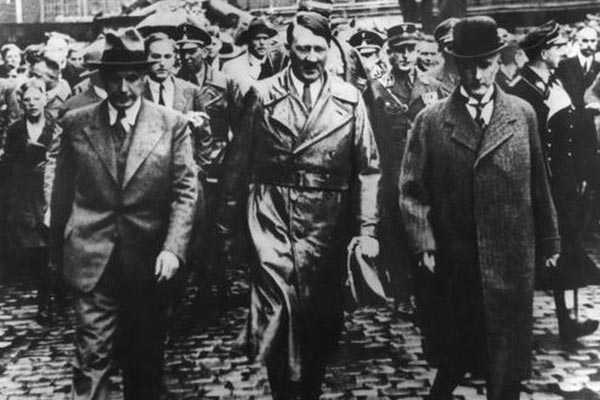
We reject the philosophy of the Manifesto because it presents the governments' choice of peace or war as a free choice regardless of the interests at stake. This view of professional politicians as men or women capable of changing reality through their will, and outside of objective material processes, is a typical projection of petty-bourgeois individualism.
Of course, Marxism does not deny the role of the individual. Great personalities can play a decisive role as long as they connect with the needs of social development. But it is the social classes that have the power to determine the course of history. Peace and war do not depend on the will of one or several individuals. They respond to the insuperable contradictions of capitalist society.
There is absolutely nothing original in the discourse of petty-bourgeois pacifism. During the First World War, Karl Kautsky proved to be the best apologist for it, and was refuted with arguments, facts and figures by many Marxists of the time, from Lenin to Rosa Luxemburg.
Kautsky argued a century ago that the politics of imperialism could be separated from its economics, i.e., that a "non-monopolistic, non-violent and non-annexionist" capitalism was possible.[34] The parallel is so obvious that we can quote word for word the response of his Marxist contemporaries to point to the new left of the 21st century as well: "Well, when the armed struggle for great power privileges is already a fact, Kautsky [the new left] sets about convincing the capitalists and the petty bourgeoisie that war is a terrible thing, while disarmament is a good thing; (...) they are, in reality, nothing but petty-bourgeois attempts to convince the financiers not to do evil"[35].
Trotsky also got to the heart of the matter in his writings on the Great War: "Theoretically and politically, pacifism has the same basis as the doctrine of social harmony between different class interests. Opposition between capitalist nation states has the same economic basis as class struggle. If we are ready to assume the possibility of a gradual reduction of the class struggle, then we must assume the gradual attenuation and regulation of conflicts between nations"[36].
The imperialist war in Ukraine has made it clear that opportunism and "pragmatism" in politics are a recipe for disaster. The leaders of the new reformist left, accustomed to the belief that the "unconscious" masses are always to blame, while the "thinking" elite do what they can with such human material, have invented nothing. Lenin also grappled with the alleged "lack of consciousness" of the working class as an argument to justify the complicity of its leaders in imperialist butchery:
"Kautsky tries to refute his left-wing opponents by attributing to them the absurd idea that, in response to the war the masses should have made the revolution 'in 24 hours' and implanted 'socialism' against imperialism; otherwise the 'masses' would have given evidence of 'lack of character' and committed 'treason'. But this is nothing more than a nonsense hitherto used by the authors of slanderous bourgeois and police libels to refute the 'revolutionaries', to which Kautsky today very proudly resorts.
Kautsky's left-wing opponents know perfectly well that revolution is not 'made', that revolutions arise out of crises and historical turns which have matured according to objective laws (independent of parties and classes), that without organisation the masses cannot have a single will and that the struggle against a powerful centralised military-state terrorist organisation is a long and difficult enterprise. (...) The masses, betrayed by their leaders at the critical moment, could do nothing; but that 'handful' of leaders had every possibility and duty to vote against the war credits, to oppose 'social peace' and the justification of war, to demonstrate in favour of the defeat of their governments, to create an international apparatus to propagandise in favour of fraternisation in the trenches, to organise clandestine publications advocating the necessity of passing to revolutionary action, and so forth.”[37]
If you want peace, fight for the socialist revolution!
We cannot establish a closed perspective of the development of the war and its consequences. "How long will this situation last, to what extremes will it escalate, will it lead to revolution? We do not know and no one can know".[38]
The war in Ukraine has brought to the surface new and powerful contradictions that are developing rapidly. The political factor (the war) and the economic factor (the crisis) are feeding back into each other, breaking the global equilibrium at all levels. The accumulated suffering grows every day. Everyday life becomes a constant and exhausting struggle: making ends meet, keeping up with the pace of work, getting medical care, getting an education, access to housing... Our young people do not see a future worthy of the name. And now, with inflation eating away at wages, with further cuts in social rights and more austerity for working families, the class struggle is escalating in country after country and consciousness is undergoing sharp changes.
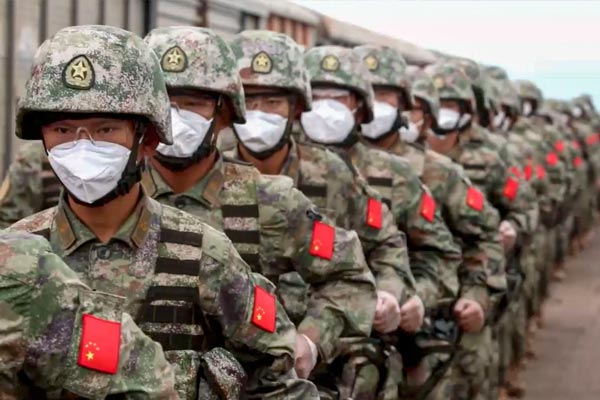
In Europe - the big loser in this conflict - the polarisation and discrediting of bourgeois democracy runs parallel to an economic and social upheaval that will bring about remarkable changes in the objective situation. A strike wave unprecedented since the 1970s is already hitting Britain (the most hysterical ally of the US in the Ukrainian war), and threatens to spread across the continent (in Belgium a general strike is already called for November). Revolutionary outbreaks will not occur in the weakest links of the capitalist chain, the central countries will also be affected by such developments.
There are many things we can already do armed with the programme of revolution. First of all, unlike the Manifesto of the new left, we do not address ourselves "to the governments that dragged the peoples to the slaughter, nor to the bourgeois politicians responsible for these governments, nor to the trade union bureaucracy that supports the warmongering bourgeoisie", our efforts are directed towards explaining to the working class "that its interests are irreconcilable with those of capitalism", calling for mobilisation "against imperialism" by agitating for "the unity of the workers of all countries", paying special attention to two sectors of society which have proved their belligerent attitude towards capitalism "women and youth..."[39]
The capitalists are fully aware of this exceptional historical moment: the system that sustains their privileges is tottering and they will go as far as necessary to prevent its collapse. Behind them they obediently parade countless individuals who call themselves "socialists" and "progressives", resurrecting the failed idea that a more democratic and peaceful imperialism is possible.
For our part, we communists who do not renounce Marxism, i.e. who are revolutionaries, affirm that capitalism with a human face is unfeasible. We are convinced that the only alternative to the apocalyptic perspective opening up before humanity is the socialist transformation of society. Our position is not the fruit of emotion but of a scientific analysis based on the study of the history of the class struggle that cost our people so much blood.
Karl Liebknecht, the German revolutionary who was murdered by order of the Social-Democratic government in January 1919 and who was the first deputy to refuse to vote war credits in the Reichstag, insisted that the "enemies of the people are counting on the oblivion of the masses"[40]. We do not forget.
We maintain that the positions developed by Lenin, Trotsky and Rosa Luxemburg a century ago are still today the best tool to confront the catastrophe that threatens us and to combat the ideological propaganda of the ruling class. Moreover, processes that were boldly pointed out by these theoreticians of Marxism, and which have developed on an infinitely larger scale (power and concentration of finance capital, the deep interdependence of all countries tied to the same world market, the numerical growth of the working class, the recurrent crises of overproduction, etc...), added to the consequences of climate change that threaten to destroy life on the planet, make their approach even more valid and vital.
We do not expect quick and easy results; workers know from our own experience that progress takes effort and perseverance. Even so, by assimilating victories and defeats, by learning from mistakes, we do not fear the future. We are determined to change the world and convinced of the victory of international socialism.
NOTAS
[1] Manifiesto "Ucrania: ¡Paz ya!"
[2] One of the latest Oxfam reports considers that “For every new billionaire created during the pandemic, one every 30 hours, almost a million people could be pushed into extreme poverty in 2022 at almost the same rate (…) 573 people became new billionaires during the pandemic (…) We expect that this year 263 million more people will fall into extreme poverty, at a rate of one million people every 33 hours.” It also warns that this summer up to 350,000 children may die of hunger in Africa. All the economic organisms consider inevitable a reduction of the growth of the GIP, a deepening of the inflation and very probable a new recession, as well as a long war.
[3] Tweet of El Pais. "Lo mínimo que podemos hacer es daros armas”, ha afirmado Borrell, mirando a Zelenski. “Necesitáis armas, armas, armas”
[4] Lenin, The Bankruptcy of the Second International
[5] Hacia una quiebra en Rusia
[6] La pobreza y la exclusión en la Unión Europa
[7] According to the World Bank, for the first time in history there are 100 million refugees, that is, 100 million people forcibly displaced from their homes.
[8] This theory formulated by the American Samuel Huntington in the Foreign Affairs magazine in 1993 after the collapse of the USSR, is periodically resurrected when Western imperialism needs to justify a new massacre to public opinion. Such was the case of French President Sarkozy in 2007, who warned the world about the imminent confrontation between Islam and the West.
[9] Pacifist utopias, 1911.
[10] This phrase is inspired by Engels's Antidhüring, specifically in the chapters entitled "Theory of violence and power" where he states: "Militarism dominates and swallows Europe."
[11] SIPRI YEARBOOK 2021. Armaments, Disarmament and International Security
[12] Sólo uno de cada tres países de la OTAN dedica el 2% de su PIB a Defensa que ahora promete Sánchez
[13] Ayudas Sociales: 900.000 beneficiarios frenta a un total de 3,3 millones de personas necesitadas y demasiada burocracia
[14] Lenin, Imperialism, the upper phase of capitalism.
[15] Una estrategia de seguridad para Alemania
[16] Trotsky, Pacifism as a Servant of Imperialism, 1917
[17] La febril búsqueda alemana de alternativas al gas ruso
[18] “According to an investigation by The Guardian, more than 6,000 workers have died in these works [soccer stadiums], without the international community condemning the events. The Al Thani regime also exercises direct persecution of the LGTBI collective. The Penal Code classifies homosexual relations between men as a punishable offense and establishes sentences of up to seven years in prison. In addition, women are discriminated against in law and in practice, while their lives are subject to the guardianship of men.” Quién es el emir de Qatar, ¿héroe o villano?
[19] On March 19, “Zelensky invoked martial law to ban 11 opposition parties. The banned parties consisted of the entire left, socialist or anti-NATO spectrum in Ukraine. (…) However, openly fascist and pro-Nazi parties like the Azov National Corps were not affected by the presidential decree.”
[20] Lenin, State and revolution.
[21] Antidhüring, Theory of violence and power.
[22] Recalling Lenin's position before and after the seizure of power, Trotsky writes: “The Bolshevik Party, not without difficulty and only gradually under constant pressure from Lenin, was able to acquire a correct approach to the Ukrainian question. The right to self-determination, that is, to separation, was equally extended by Lenin to both Poles and Ukrainians. He did not recognize aristocratic nations. Any attempt to evade or postpone the problem of an oppressed nationality was considered an expression of Great Russian chauvinism.” Quote from the article The Ukrainian Question, April 22, 1939.
[23] “As long as it depends on the military might of the imperialist states, the victory of one side or the other can only mean a new dismemberment and even more brutal vassalage of the Ukrainian people. The program of independence of Ukraine in the epoch of imperialism is directly and inextricably linked with the program of the proletarian revolution. (Leon Trotsky, The Ukrainian Question, 1939). For a more detailed analysis of the Ukrainian national question, see the article by Miguel Campos, Lenin and the Ukrainian question. Lenin y la cuestión nacional ucraniana. Guerra, revolución y contrarrevolución
[25] War and Russian Social Democracy, Lenin, October 1914.
[26] Yolanda Díaz apoya el envío de más armas a Ucrania: “Tienen derecho a legítima defensa”
[27] In his speech to the Russian people 48 hours before the military intervention in Ukraine, Putin denounced Lenin and the Bolsheviks for the "crime" of having put into practice, after the October 1917 revolution, the right to self-determination and the independence of Ukraine, favoring its integration on an equal footing, with Russia and other nations, in the Union of Soviet Socialist Republics (USSR). In this speech, Putin showed that he is a Great Russian chauvinist, an imperialist, a staunch enemy of Bolshevism, a fierce anti-communist and, in any case, a continuation of Stalin's repressive, centralizing and Russifying policy.
[28] War and Russian Social Democracy, Lenin, October 1914.
[29] Lenin, Imperialism, the upper phase of capitalism.
[30] Lenin, The bankruptcy of the Second International
[31] Quote from Engels contained in the prologue to the Borkheim pamphlet: In Memory of the German Ultrapatriots, 1806-1807, December 1887. Quoted by Lenin in his article Prophetic Words.
[32] Trotsky, From a scratch to the danger of gangrene, January 24, 1940.
[33] Gustav Krupp y el acero de los nazis
[34] Lenin, Imperialism, the upper phase of capitalism.
[35] Lenin, The bankruptcy of the Second International
[36] Trotsky, Pacifism as a Servant of Imperialism, 1917.
[37] Lenin, The bankruptcy of the Second International
[38] Lenin, The bankruptcy of the Second International
[39] Leon Trotsky, IV International Manifesto Against Imperialist War
[40] The main enemy is at home, 1915.






